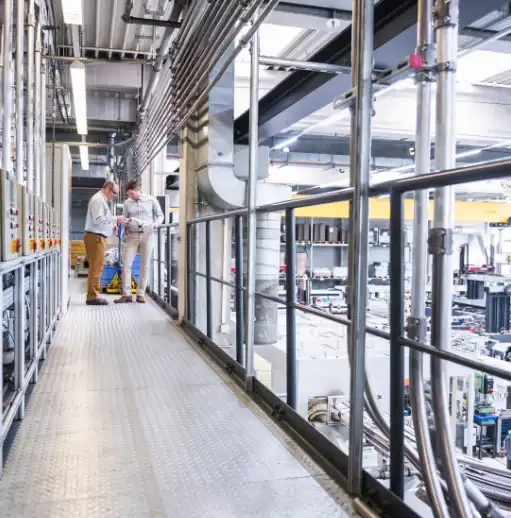
Enterprise strategy relies heavily on space planning in today’s workplace landscape. The hybrid work model, increasing demand for energy efficiency, and the growing need for sustainability have placed immense pressure on enterprises to rethink how they manage their space. Choosing the right space planning software has gone beyond a simple operational decision — it’s now a strategic one.
For large enterprises managing expansive portfolios, evaluating space planning solutions requires a deep understanding of their specific needs and long-term goals. We break down the key factors enterprises must consider when selecting space planning software and how Eptura’s integrated solutions, such as Archibus, Eptura AI, and asset management tools, provide answers to their challenges.
The problem: Complexity in managing space at scale
Large enterprises face a distinct set of challenges in space planning, including scalability, flexibility, and integration with broader organizational strategies. Here’s a closer look:
1. Managing large, diverse portfolios
Large enterprises often operate across multiple locations, each with unique space requirements. From corporate headquarters to satellite offices, ensuring optimal utilization of spaces is complex. Traditional tools fail to adapt to the scale and variability of such environments.
Solutions like Eptura’s Archibus offer unparalleled scalability, enabling organizations to manage thousands of spaces seamlessly. Its cloud-based architecture ensures adaptability, even as enterprises grow or restructure their portfolios.
2. Hybrid work and dynamic spaces
The rise of hybrid work has redefined space planning. Enterprises must balance the fluctuating demand for office space while providing a seamless experience for employees.
Key considerations:
- Dynamic space management: Hybrid models require tools that can manage hot-desking, room scheduling, and real-time occupancy tracking.
- Employee-centric design: Flexible spaces must prioritize employee happiness and productivity.
- Predictive insights: Anticipating space needs ensures resources aren’t wasted.
Integrating real-time data into workplace strategies helps enterprises understand occupancy trends and dynamically allocate spaces. With tools like Eptura AI, businesses can track real-time occupancy, analyze utilization, and make informed decisions about space allocation.
3. Sustainability and ESG compliance
Sustainability is no longer optional. Enterprises face mounting pressure to meet Environmental, Social, and Governance (ESG) criteria, improve energy efficiency, and contribute to net-zero goals. Meeting these goals requires data-driven insights and proactive strategies. Solutions with energy tracking and reporting capabilities help organizations optimize energy use and align with sustainability goals, like Eptura’s Archibus.
4. Scalability: A foundation for enterprise success
For enterprises, scalability is not negotiable. The right software must grow alongside the business while maintaining performance and reliability.
- Adaptability to real-time needs
Eptura’s integrated solutions enable organizations to adjust their space planning in real-time, whether it’s reallocating spaces for new projects or scaling operations across new markets.
- Centralized data for decentralized teams
Archibus centralizes data across locations, providing a single source of truth for space utilization, maintenance, and energy consumption. This allows facility managers and corporate decision-makers to stay aligned, even across vast geographic spreads.
5. Enhancing efficiency, flexibility, and ROI
When enterprise leaders are on the hunt for impactful space planning software, they’re often focused on efficiency and return on investment. Space planning software must deliver clear, measurable benefits.
- Cost efficiency and space optimization
Unused spaces translate directly into wasted resources. Eptura’s space utilization analytics help identify underused areas and suggest opportunities for consolidation, leading to significant cost savings.
- Predictive analytics for future-proofing
Eptura AI uses predictive analytics to anticipate space needs, reducing the risk of overinvestment in office space. Enterprises can make data-backed decisions about leasing, maintenance, and renovations.
Why integration is critical for large enterprises
Enterprises rely on a myriad of systems — HR, IT, finance, and more. Space planning software must integrate seamlessly into this ecosystem.
Interoperability with existing systems
Large enterprises rely on a complex web of systems, from HR platforms to enterprise resource planning (ERP) tools. Space planning software must integrate smoothly to ensure consistent data flow and collaboration.
Challenges:
- Avoiding data silos that limit insights.
- Ensuring interoperability with other enterprise tools.
- Simplifying workflows for cross-department teams.
Eptura’s solutions, including Archibus, boast open architectures designed for integration. Whether it’s linking with facility management systems, asset management platforms, or ERP tools, Eptura ensures a unified ecosystem that enhances collaboration and decision-making.
Cross-department collaboration
Effective space planning involves input from various departments — HR, IT, finance, and facilities management. A collaborative platform ensures that all stakeholders have access to relevant data, allowing them to make better decisions.
How Eptura helps:
- Provides centralized dashboards accessible to all departments.
- Enables cross-functional teams to align on space needs and budgets.
- Offers actionable insights for long-term strategic planning.
User experience: empowering large teams
A workplace isn’t just a space; it’s an ecosystem that shapes employee productivity and satisfaction. Enterprises must prioritize user-friendly tools that enhance employee experiences.
Intuitive interfaces for all users
Eptura’s solutions are designed with user-friendliness in mind. Whether it’s a facilities manager optimizing layouts or an employee booking a meeting room, the interface is accessible and straightforward.
Self-service empowerment
Eptura empowers employees with self-service options, reducing the burden on facility management teams. Features like mobile room booking and real-time occupancy updates enhance autonomy and satisfaction.
Why Eptura leads the way in space planning software
Evaluating space planning software is a critical step for enterprises aiming to optimize their operations, enhance employee experiences, and align with sustainability goals. Eptura’s integrated solutions, including Archibus and Eptura AI, provide scalable, data-driven tools to address these challenges head-on.
By offering features like real-time occupancy tracking, energy efficiency analytics, and seamless system integration, Eptura empowers enterprises to:
- Improve efficiency and ROI.
- Adapt to hybrid and flexible work environments.
- Achieve sustainability and ESG objectives.
Take the next step
To see how Eptura can transform your workplace strategy, schedule a demo today and explore the possibilities of smarter, data-driven space planning.








